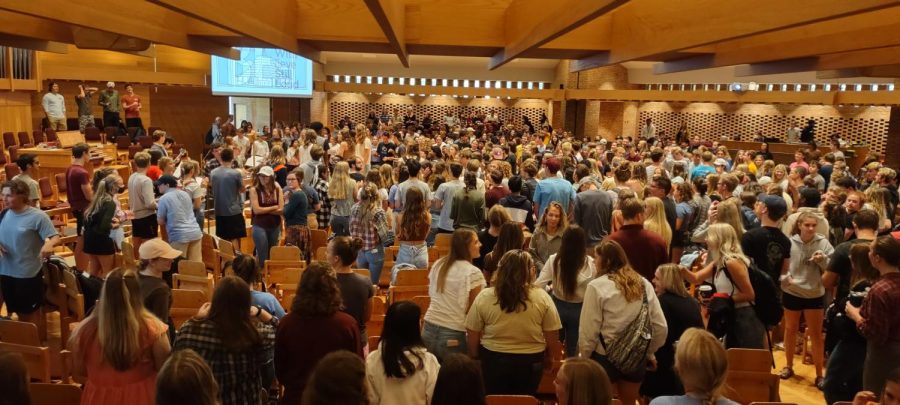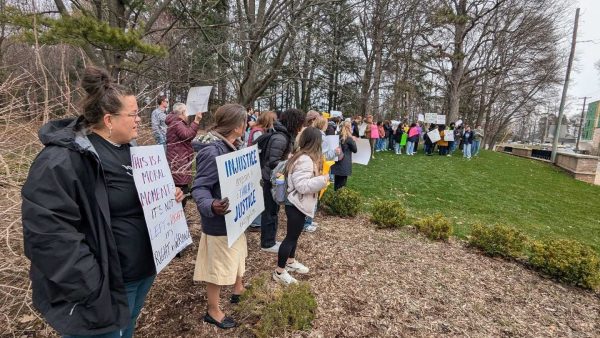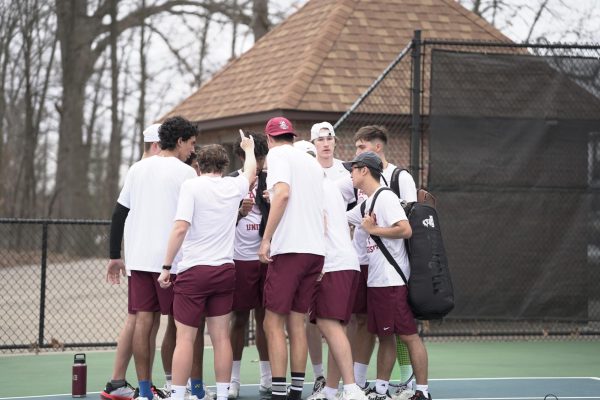Could an Asbury-like revival happen at Calvin?
Sources say revival at Calvin would require a deeper understanding of the mystery of the Holy Spirit.
The Asbury Revival — a chapel service at a Christian university turned two-week prayer and worship event drawing thousands — has been in the news for the last month. Responses among Christians have varied, from praise to skepticism to cautious optimism. Other Christian colleges, like Cedarville, report revival experiences on their campuses as well.
Chimes talked to pastoral partners, a student and a history professor specializing in revival to better understand what revival is and how groups on campus are seeking change and deeper devotion, whether or not that looks like revival in the same way Asbury did.
Traits of “revivals”
For centuries, Christian history has been interspersed with periods of revival or awakening. Tucker Adkins, a de Vries Postdoctoral Teaching Fellow, studies 18th-century awakenings in the English-speaking world. According to some clergymen of the time, revivals in that period were marked by “‘heartfelt’ soul-change and more seriously embraced ‘Gospel truth’” but their congregants also embraced “outlandish religious ‘exercises’ and bizarre spiritual encounters,” Adkins told Chimes.
In general, revivals are large religious events marked by high energy and emotional fervor.
“Trademarks of a new awakening include revivalists excitedly sharing news of the outpouring, testifying to greater spiritual sensitivity and changing (sometimes quite radically) their physical and emotional postures,” Adkins said.
The media also plays a role in revivals. “Whether it was a rapidly maturing print culture in the 18th century or modern social media in the 21st, exchange of information is vital for fostering anticipation, hopefulness and publicity for revivals,” Adkins said. “As we saw in February, the Asbury Revival did just that.”
Revival as culture change
Pastoral Partner Moon Bae Kim, pastor of Korean Grace CRC, points to a historical revival to shed light on the Asbury Revival. Kim told Chimes that the Pyongyang Great Revival, which happened in Korea in 1907, occurred only after missionaries to Korea grew frustrated that the gospel was not taking root and were planning to withdraw.
This 1907 revival exploded when one revival meeting became several revival and prayer meetings that included a time of public confession. According to Kim, this was a very successful revival because congregants “did not remain in their church buildings.” They repented to God, to each other and to those in their community. In seeking reconciliation, as well as going on to build private schools and a hospital, they helped change the culture.
This “kingdom-building” activity born of repentance is a Biblical response to revival, Kim told Chimes, citing John the Baptist’s mandate: “repent, for the kingdom of God is near” (Matthew 3:2), which, he says calls for repentance and then action.
Kim and Pastoral Partner David Sung (pastor of Living Water CRC) said that a revival must include the right motivation to prayer, the Word of God, confession and unity that results in “kingdom work.” Though they rejoiced to see that the Asbury Revival encapsulated many of these, they said that “time will tell” whether the revival will result in kingdom work where those who are part of the revival transform the culture around them, like in the 1907 Pyongyang Great Revival.
Erupting prayer
According to Kim, the Asbury Revival was precipitated by many small prayer meetings that had happened before the expanding chapel service. He learned this due to his connection with Calvin alumnus Hwa-Jin Kim who studies at Asbury Theological Seminary.
Kim said that revival is “like a volcano.” Just as magma builds up in a volcano, so too does prayer build up until it erupts into a revival, according to Kim.
Senior Cosette Ferris and co-leader of Met By Love, hopes to provide a space on campus for students to build up what Kim described as spiritual magma. Met By Love is a “family” of students who host worship nights, create space for testimony-sharing and gather as a group to be in the presence of Jesus, according to Ferris.
The community was “birthed out of a heart cry of students who were … beginning to encounter the person of Jesus,” she said, and the group’s goal is “to create space for students to be able to receive true relationship with Jesus [and the] freedom [and] love that’s so available through his presence.”
Ferris did not attend the 2023 Asbury revival event; however, many of her friends did. What made this revival unique to Ferris, based on what her friends shared, was that “it was so pure.” She said there were no big names, no incentives, but rather, “it was literally just the presence of God that was drawing people in.”
Though some might be skeptical of the emotional nature of revival events, Ferris told Chimes that a big reaction to the person of God is appropriate and necessary, citing Luke 7 and the story of the woman with the alabaster jar.
“People respond when there’s a person of significance in the room, and how much more significant is literally the God of the universe, the savior of every single one of our souls? How much more should we be responding to his presence?” she said.
Denominational differences
Technically, Asbury University is not affiliated with a denomination; however, the school is named after the founder of American Methodism and adheres to “the doctrinal standards established by John Wesley and his immediate successors.” This theological tradition “emphasizes transformational encounters with the Holy Spirit,” according to an article by Inside Higher Ed. The campus has a history of revival events, with the most recent one being in 2006.
Sung and Kim both recognize that there are denominational differences that might shape how revival at Calvin would look as compared to how it looked at Asbury. Calvin is a part of the CRC, which as a denomination values pietism (which includes singing, reading the Bible and prayer), is very theologically-oriented and emphasizes kingdom work along the lines of Abraham Kuyper’s famous words “every square inch,” according to Kim.
Calvin as a university has adopted an emphasis on Kuyper’s philosophy, Kim told Chimes. According to Sung, in order for revival to happen at Calvin, all three components would need to be brought into harmony with an understanding or recognition of the mystery of the Holy Spirit. Due to the Enlightenment, Sung told Chimes, many have lost an understanding of the mystery of the Holy Spirit. He calls this loss “rational reductionism.”
“The whole purpose of revival, these manifestations of the spirit of God,” Ferris said, “is… essentially just to shake up religion and to reset the norm and bring us back into … New Testament Christianity, which is [an] intimate relationship with the Lord and a constant pursuit of Him and His Spirit in our lives.”
Revival at Calvin?
Ferris sees complacency as the biggest obstacle to a significant revival event occurring at Calvin. Ferris told Chimes she thinks it is easy for students to do all the “right” things, like go to church and attend Bible studies without living a daily walk in relationship with the Lord. “I think that … a lot of us have just gotten comfortable with, like, just living in the routine, and — I don’t know, I just feel like God wants to shake that up and be like ‘Hey, I have so much more for you!’” Ferris said.
Ultimately, she said, only God can bring revival: “We simply invite people to encounter His presence.”
Sung told Chimes he envisions longer chapels and more frequent LOFT services as opportunities for students to worship together and for the Holy Spirit to move.
Sung believes a revival could start at Calvin with “just a few [like-minded people] praying together, seeking His face.”
A revival event is not the end goal for Ferris, but rather, “revival is … us being willing to invite the Holy Spirit to operate in and through us on a daily basis. It’s literally what we were created for.” She said she “totally believe[s] God wants to do it here.”











Carol • Mar 22, 2023 at 12:00 pm
If everyone is totally happy with the way the world is going and their own lives, then I doubt anything will change. BUT if they are hungry for GOD for HIS blessings and for their lives to be changed forever for the good and also our country, then YES there is HOPE for. Calvin College. Seek ye FIRST the kingdom of GOD and all these things will be added unto YOU. Who wouldn’t want a better life, a better way, and a change in our direction.? AMEN…GO FOR IT…Seek GOD and He will answer you…
L • Mar 20, 2023 at 4:36 pm
Just a gentle correction: Pyongyang is in North Korea
E • Mar 21, 2023 at 9:55 pm
Gentle question: when was North Korea formed? Answer: well after 1907